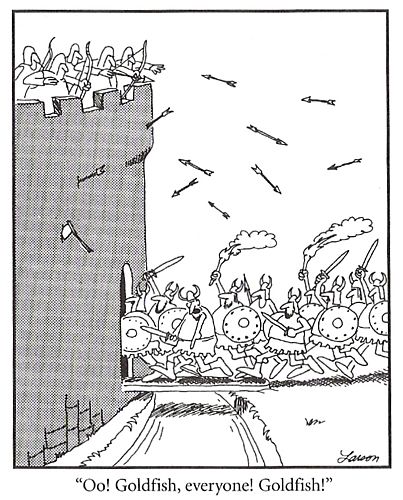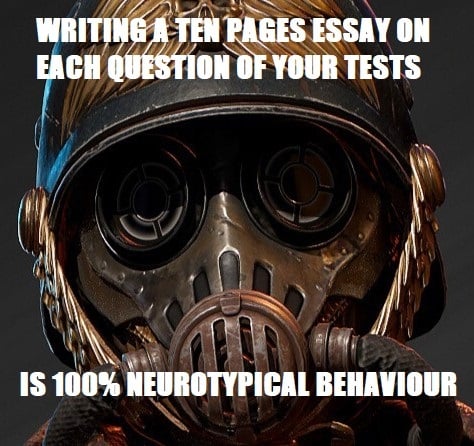This is one of a series of discussion posts based on questions from the AQ-10 autism test.
4. I usually concentrate more on the whole picture, rather than the small details.
- Definitely Agree
- Slightly Agree
- Slightly Disagree
- Definitely Disagree
Is this statement true for you? Can you think of any examples? Is it an easy or difficult question for you to answer?
You can take the full AQ-10 test here. Note this test is intended as a quick screener, and cannot diagnose or rule out any condition on its own.
I really don’t understand the question. Seams like it is missing something like context.
I mean I notice all kind’s of little things that when I bring them up with NTs end of annoying them but would not have noticed otherwise. But other times I look at things from a wider view that that might look like I lack empathy.
I feel like questions with context are easier to answer. Like what you do in situation X.
deleted by creator
Disclaimer: I am not diagnosed, but I am looking into it and I am scoring high on tests.
I believe the meaning of these questions is subjective. To my understanding the process to create those questionnaires looks like the following:
- A bunch of people are asked a bunch of questions
- They answered with little to no guidance
- A set of questions was picked with a threshold that maximizes sensitivity and specificity (and other scary math).
I am oversimplifying but I hope you get the idea, people answered on their own interpretation of the question and still autistic people choose some answers more often than people outside the spectrum.
Not that answering subjectively is any easier, it’s just that looking for an objective answer may be impossible.
My answer is “slightly disagree”, my knee jerk reaction to most situations is to look at details until I see patterns forming and I am able to look at the whole picture. I have trained myself to take a step back and look at things as a whole once in a while but if I am tired I tend to forget it.
An example I have used when explaining that to neurotypicals is dot-work paintings, I first notice the individual dots and then I see the painting as a whole. The transition takes a few seconds but it’s not long enough that anyone besides me would notice.

Definitely Disagree
How do I even with this question? The whole picture is made up of small details, and the details are all in the context of the whole picture. So it’s both. The answer is both and it depends on what the thing is and why you’re having to concentrate on it and where you are in that process. Any project you work on will need big picture perspective to decide what things you need to do, and also need detail perspective to do those things. Any field of study will have its overarching themes and its individual examples.
Let’s look another way. I know they’re not talking about a literal picture (and why use metaphors in an autism test of all things?), but let’s pretend they are. When I look at The Hay Wain I see an idyllic rural scene. Then I see the cart, the house, the horsemen, the dog. I see the whole picture first, then I pick out details. When I look at The Persistence of Memory, I see the face, the clock, the tree, the cliff. Then I wonder what it could mean. I see the details, then (try to) assemble a full picture. It depends. It always flipping depends.
If It gave me specifics, I could answer this. But I’m just floundering with this sort of generality. I am leaning towards Slightly Disagree, only because I am crying out for details trying to interpret this question.
I feel like the real autism test is if you ask a bunch of questions about the questions on the autism test.
The context for me posting these is I’m working through a pack of dozens of these sort of questions from my health provider. I’m giving serious thought to returning it with an attached sheet of notes and queries.
 art source : https://www.artstation.com/artwork/5XlwVA
art source : https://www.artstation.com/artwork/5XlwVA
Obligatory not diagnosed, though fairly high scoring.
I go through swings of obsessing on one or the other. I notice this in my fiction writing and worldbuilding a lot, where there will be periods where I keep posting about small, damn near inconsequential aspects of the lore and some periods where I feel like a failure for not having an outline of the entire story figured out and just do that for a while. And of course I spend insane amounts of effort to work the small details I develop into my greater plot in a way that doesn’t feel shoehorned in and the result of “I already spent effort developing this so I have to use it” syndrome.
I also genuinely think I enjoy writing endless notes on lore (some of which with enough prose to potentially pass for a documentary piece in-universe) than I do actually writing the actual story. Not sure of this means I focus more on details than the bigger picture but I do know this is a pretty big detriment to any potential fiction writing career, evident by the fact that I have been worldbuilding multiple fictional universes since literally my childhood but have yet to put out any actual stories based on them, despite meaning to.




